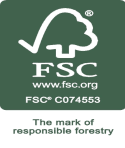FSC Certification
 In March 2010, the Massachusetts Department of Conservation and Recreation (DCR) Private Lands Group Certification program was certified to Forest Stewardship CouncilTM (FSC) Forest Management standards. In July 2010, the UMass Dartmouth Campus Forest was enrolled in the Private Lands program. Forest Management on the Campus Forest will be audited by the Rainforest Alliance SmartWood Program, which is accredited by the FSC.
In March 2010, the Massachusetts Department of Conservation and Recreation (DCR) Private Lands Group Certification program was certified to Forest Stewardship CouncilTM (FSC) Forest Management standards. In July 2010, the UMass Dartmouth Campus Forest was enrolled in the Private Lands program. Forest Management on the Campus Forest will be audited by the Rainforest Alliance SmartWood Program, which is accredited by the FSC.
Goals of Forest Management:
- Promote Diversity and Ecological Integrity
The overarching management goal is to increase old-growth characteristics. This means assisting an even-aged forest, established on abandoned pasture, to become a patchwork of multi-aged forest stands. Management includes the inventory and promotion of habitat structures such as standing dead trees and large-diameter downed woody material. - Developing Educational Opportunities
The University wants to make the Campus Forest a hub for forest related education. This includes developing infrastructure, coursework and community outreach. - Promoting a "Working-Land Ethic"
Working-land is forest or farmland that is actively generating revenue or products. This product flow gives the land value to offset development pressures. Working-land also creates local jobs and develops a land base that can sustain those jobs. Working-land increases local self-sufficiency in food, fiber, fuel and other forest and farm products. Working-land avoids the outsourcing of environmentally negative practices by keeping them local and sustainable. - Developing Recreational Resources
The Campus Forest is open to the public for passive recreation. The University wants the public to experience and enjoy this amazing property and to learn about our local forest biology, conservation needs, land-use history and its role in environmental, social and economic sustainability.
/prod01/production-cdn-pxl/media/umassdartmouth/about/map-image-1-850X480.jpg?text=fallback320)
